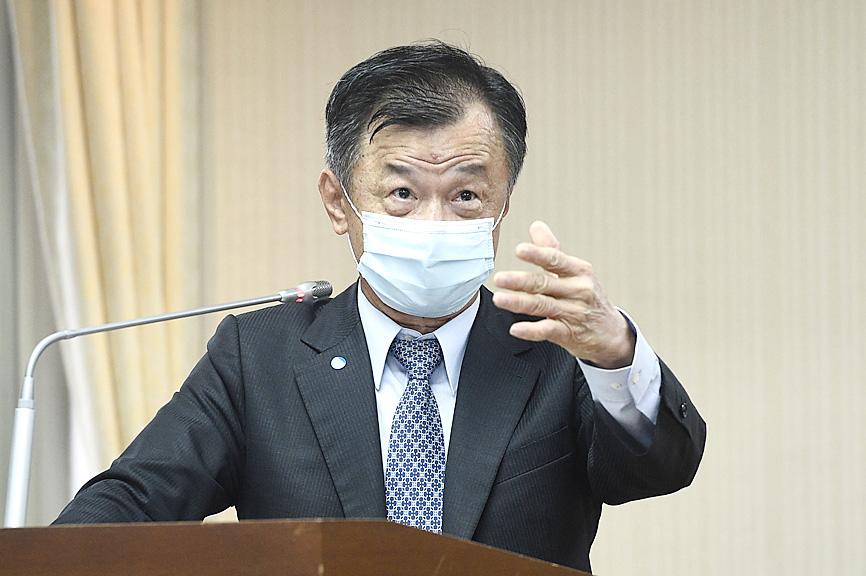Legislators yesterday called for an amendment to the law governing Hong Kong and Macau affairs to prevent Chinese-funded enterprises poaching Taiwanese talent and infiltrating the nation.
Mainland Affairs Council (MAC) Minister Chiu Tai-san (邱太三) said that amending the Laws and Regulations Regarding Hong Kong & Macau Affairs (香港澳門關係條例) is a serious matter, and promised to discuss the issue with the Ministry of Economic Affairs (MOEA).
Chinese-funded enterprises often disguise themselves as foreign-funded or Hong Kong-funded firms to evade regulations, Democratic Progressive Party (DPP) Legislator Lo Mei-ling (羅美玲) said at a question-and-answer session at the legislature.

Photo: George Tsorng, Taipei Times
The Investigation Bureau discovered 33 such cases since 2020, Lo said.
Of the 33 enterprises, 19 were disguised as Taiwanese-funded; 11 were funded by overseas Chinese, foreign nationals or Hong Kong sources; two secretly set up private research and development centers in Taiwan; and one was a Chinese company that opened an office in Taiwan, Lo said.
About 500 to 600 people were involved in these cases, contravening the Act Governing Relations Between the People of the Taiwan Area and the Mainland Area (兩岸人民關係條例), she added.
Lo requested that Article 31 of the Hong Kong and Macau act be reviewed and amended to safeguard national security, economic development and Taiwan’s industrial advantages.
Chinese companies poaching Taiwanese talent used to be governed by the Trade Secrets Act (營業秘密法), but the National Security Act (國家安全法) has to be amended when core technologies are involved, Chiu said.
Regarding the Hong Kong and Macau Act, the government has been revising relevant regulations as the two regions are no longer colonies, Chiu said, adding that the government would intervene if more than 30 percent of a company’s funding comes from Chinese sources.
Meanwhile, DPP Legislator Michelle Lin (林楚茵) questioned the government’s proposal to amend the Act for Promotion of Private Participation in Infrastructure Projects (促進民間參與公共建設法) while the MAC is simultaneously clamping down on Chinese-funded enterprises.
The amendment would allow investment from foreign-funded firms in key infrastructure projects, such as green energy, railroads and transportation, she said.
If the proposed amendment takes effect, Chinese-funded enterprises could easily channel funding through companies registered abroad to infiltrate Taiwan, she said.
Chiu said that investment in certain fields is clearly forbidden by the MOEA, adding that the government would strictly regulate Chinese-funded firms.
However, the government would consider revising the regulation on funding from Hong Kong, he added.

CHANGING LANDSCAPE: Many of the part-time programs for educators were no longer needed, as many teachers obtain a graduate degree before joining the workforce, experts said Taiwanese universities this year canceled 86 programs, Ministry of Education data showed, with educators attributing the closures to the nation’s low birthrate as well as shifting trends. Fifty-three of the shuttered programs were part-time postgraduate degree programs, about 62 percent of the total, the most in the past five years, the data showed. National Taiwan Normal University (NTNU) discontinued the most part-time master’s programs, at 16: chemistry, life science, earth science, physics, fine arts, music, special education, health promotion and health education, educational psychology and counseling, education, design, Chinese as a second language, library and information sciences, mechatronics engineering, history, physical education

The Chinese military has boosted its capability to fight at a high tempo using the element of surprise and new technology, the Ministry of National Defense said in the Quadrennial Defense Review (QDR) published on Monday last week. The ministry highlighted Chinese People’s Liberation Army (PLA) developments showing significant changes in Beijing’s strategy for war on Taiwan. The PLA has made significant headway in building capabilities for all-weather, multi-domain intelligence, surveillance, operational control and a joint air-sea blockade against Taiwan’s lines of communication, it said. The PLA has also improved its capabilities in direct amphibious assault operations aimed at seizing strategically important beaches,

New Taipei City prosecutors have indicted a cram school teacher in Sinjhuang District (新莊) for allegedly soliciting sexual acts from female students under the age of 18 three times in exchange for cash payments. The man, surnamed Su (蘇), committed two offenses in 2023 and one last year, the New Taipei District Prosecutors’ Office said. The office in recent days indicted Su for contraventions of the Child and Youth Sexual Exploitation Prevention Act (兒童及少年性剝削防制條例), which prohibits "engaging in sexual intercourse or lewd acts with a minor over the age of 16, but under the age of 18 in exchange for

The High Prosecutors’ Office yesterday withdrew an appeal against the acquittal of a former bank manager 22 years after his death, marking Taiwan’s first instance of prosecutors rendering posthumous justice to a wrongfully convicted defendant. Chu Ching-en (諸慶恩) — formerly a manager at the Taipei branch of BNP Paribas — was in 1999 accused by Weng Mao-chung (翁茂鍾), then-president of Chia Her Industrial Co, of forging a request for a fixed deposit of US$10 million by I-Hwa Industrial Co, a subsidiary of Chia Her, which was used as collateral. Chu was ruled not guilty in the first trial, but was found guilty